Dove andrete domani? Andremo in centro. (Where are you going tomorrow? We are going downtown.)
The verb used in this sentence is andare.
It is conjugated in the future tense. Here are some of the most important things to know about the Future Tense in Italian – How to Form and Use It.
Do you know how to use the Future Tense in Italian?
Look at these examples to see how the Future verb is used.
L’anno prossimo andrò in vacanza a Londra.
Domani il tempo sarà bello e farà caldo.
Se l’anno prossimo avrò abbastanza soldi, comprerò una nuova automobile
Listen to the examples
Read the explanation to learn more.

To form the regular “futuro semplice” add the appropriate endings to the stem of the verbs.
In general, the future tense is used less in Italian than in English, and it is often possible when talking about something which we are almost sure will happen, to use the present: Parto domani.
♦ How to use the future ♦
In Italian The FUTURO SEMPLICE is used in different situations:

➜ Azione in un tempo futuro (Action in a future time)
Indicating an action that takes place in a future time
Es.
Domani alle cinque incontrerò Giulia (I will meet Giulia tomorrow at five)
➜ Previsioni: (making predictions/forecasting)
Es.:
Domani ci sarà il sole. (It will be sunny tomorrow.)
Secondo me, domani tornerà il bel tempo! (I think that tomorrow the weather will be nice again!)
➜ Promesse: (making promises)
Es.:
Mamma, ti prometto che da domani studierò di più! (Mom, I promise you that I will study more tomorrow!)
Domani smetterò di fumare. Prometto! (Tomorrow I’ll quit smoking. I promise!)
➜ Programmi/PROGETTI: (making plans)
Es.:
L’estate prossima andremo in vacanza in montagna. (Next summer we will go on holiday to the mountains.)
L’anno prossimo farò un viaggio negli Stati Uniti! (Next year I’ll travel to the States!)
➜ Supposizioni / dubbi: (Assumptions/doubts)
Es.:
Che ora sarà? Saranno le quattro. (What time can it be? It is probably four o’clock.)
Quanti anni avrà Luigi? Avrà ventitré anni. (How old can Louis be? He is probably twenty-three.)
♦ Forming the Future Tense ♦
Italian uses only one word to express the future, while English uses two words: will or shall + the infinitive of a verb.
Regular Verbs Ending in -are – ere – ire
The future tense regular verbs are formed by changing the infinitive ending –are – ere – ire to obtain the root for the future tense.
PARLARE
root -> PARL–
- Parlerò
- Parlerai
- Parlerà
- Parleremo
- Parlerete
- Parleranno
PRENDERE
root -> PREND-
- Prenderò
- Prenderai
- Prenderà
- Prenderemo
- Prenderete
- Prenderanno
SENTIRE
root -> SENT-
- Sentirò
- Sentirai
- Sentirà
- Sentiremo
- Sentirete
- Sentiranno
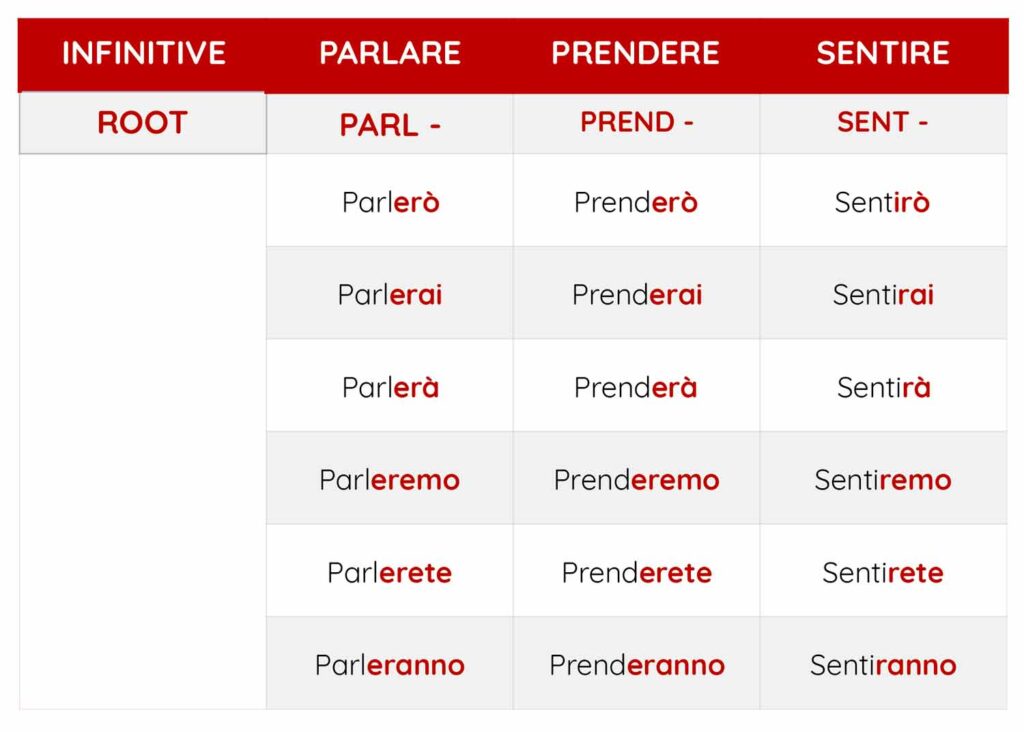
Irregular Verbs
Verbs that lose the E or the A
ANDARE
root -> AND–
- Andrò
- Andrai
- Andrà
- Andremo
- Andrete
- Andranno
CADERE
root -> CAD-
- Cadrò
- Cadrai
- Cadrà
- Cadremo
- Cadrete
- Cadranno
DOVERE
root -> DOV-
- Dovrò
- Dovrai
- Dovrà
- Dovremo
- Dovrete
- Dovranno
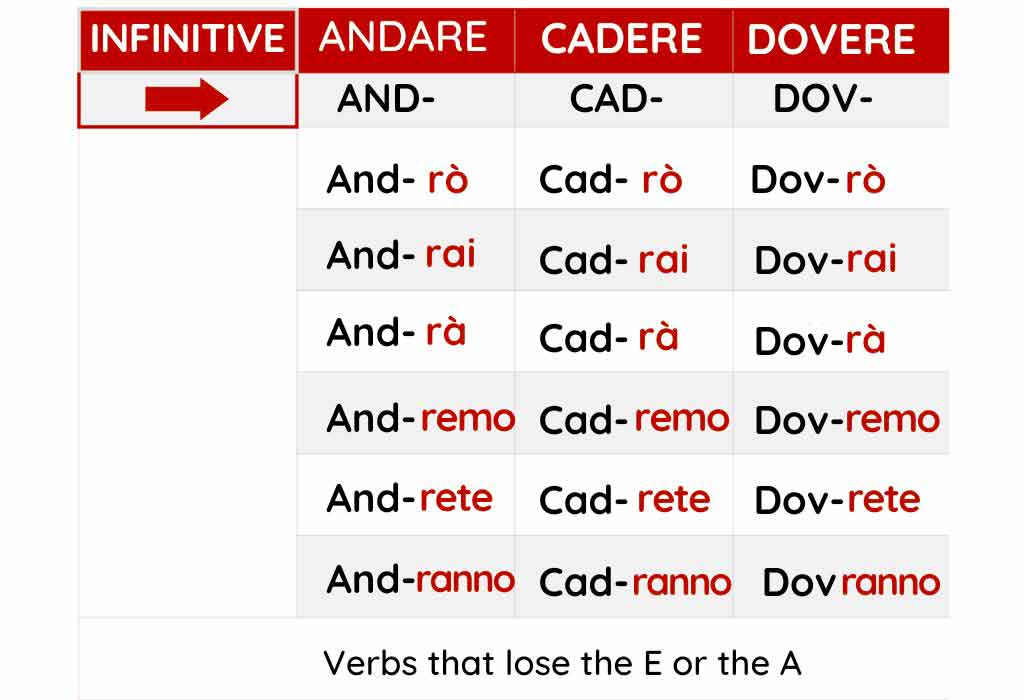
SAPERE
root -> SAP–
- Saprò
- Saprai
- Saprà
- Sapremo
- Saprete
- Sapranno
VEDERE
root -> VED-
- Vedrò
- Vedrai
- Vedrà
- Vedremo
- Vedrete
- Vedranno
VIVERE
root -> VIV-
- Vivrò
- Vivrai
- Vivrà
- Vivremo
- Vivrete
- Vivranno
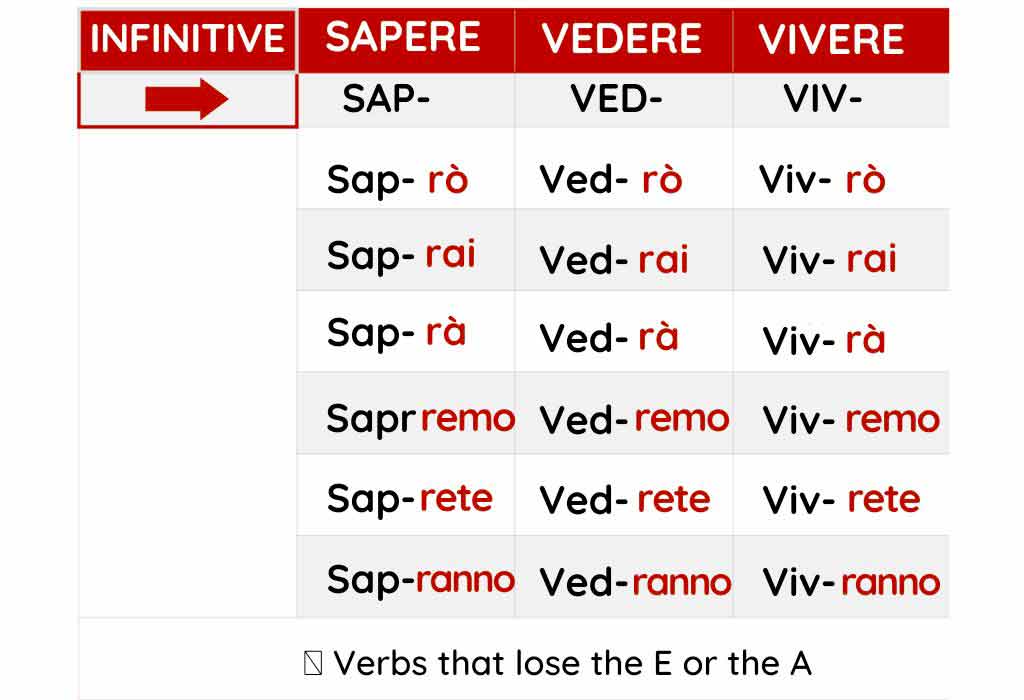
Verbs with double RR
BERE
root -> BER–
- Berrò
- Berrai
- Berrà
- Berremo
- Berrete
- Berranno
RIMANERE
root -> RIMAR-
- Rimarrò
- Rimarrai
- Rimarrà
- Rimarremo
- Rimarrete
- Rimarranno
TENERE
root -> TER-
- Terrò
- Terrai
- Terrà
- Terremo
- Terrete
- Terranno
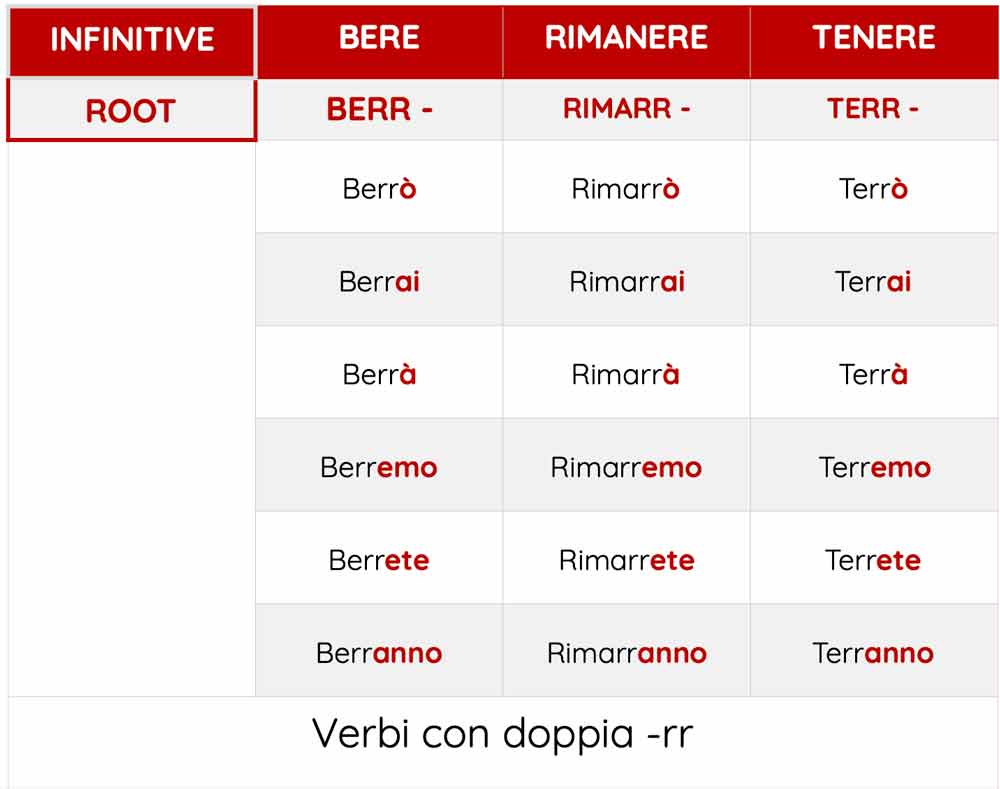
TRADURRE
root -> TRADUR–
- Tradurrò
- Tradurrai
- Tradurrà
- Tradurremo
- Tradurrete
- Tradurranno
VENIRE
root -> VENIR-
- Verrò
- Verrai
- Verrà
- Verremo
- Verrete
- Verranno
VOLERE
root -> VOR-
- Vorrò
- Vorrai
- Vorrà
- Vorremo
- Vorrete
- Vorranno
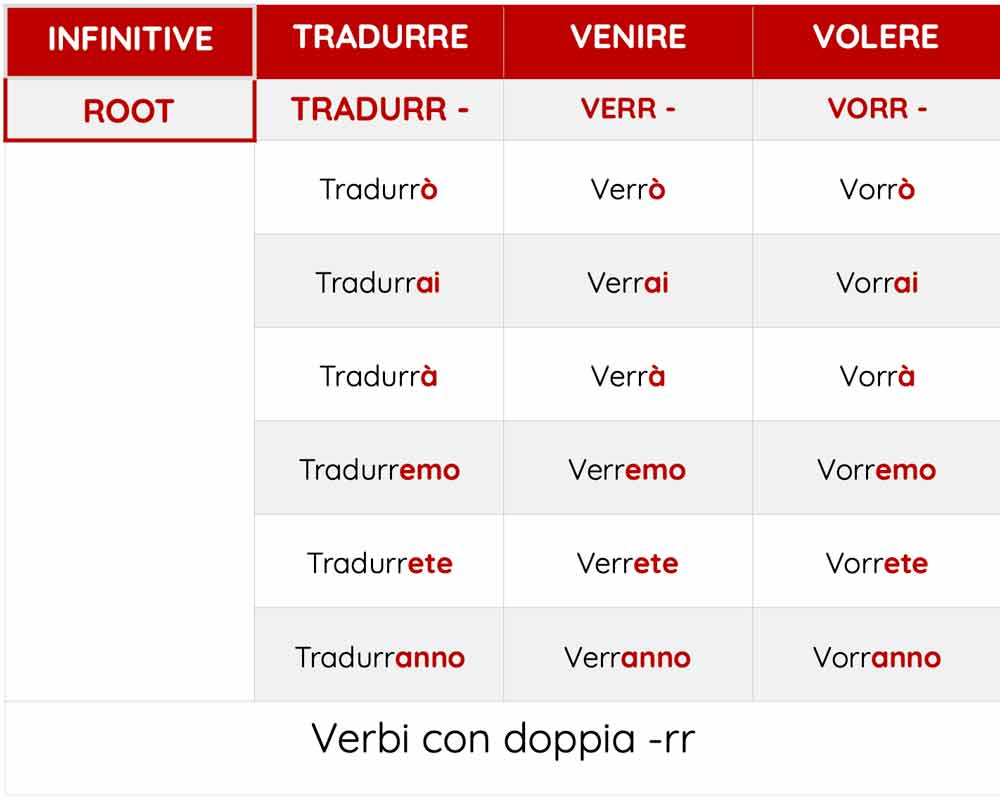
Verbs that keep the A
DARE
root -> DA–
- Darò
- Darai
- Darà
- Daremo
- Darete
- Daranno
FARE
root -> FA-
- Farò
- Farai
- Farà
- Faremo
- Farete
- Faranno
STARE
root -> STA-
- Starò
- Starai
- Starà
- Staremo
- Starete
- Staranno
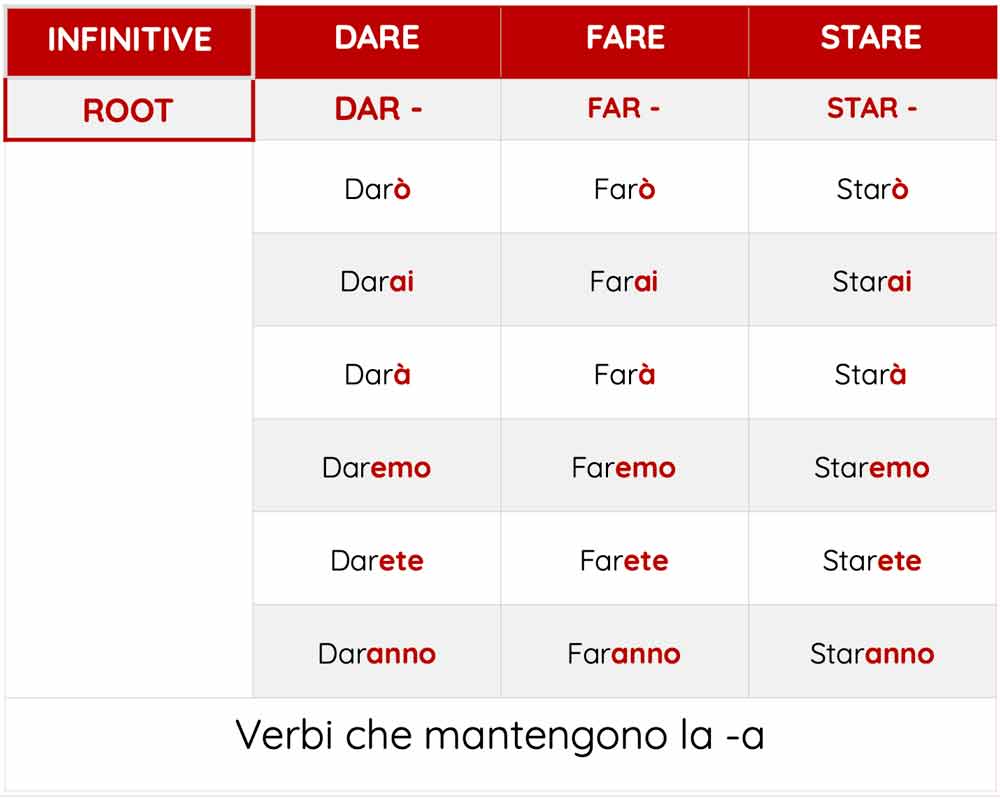
Future of Auxiliary verbs
AVERE
root -> AV–
- Avrò
- Avrai
- Avrà
- Avremo
- Avrete
- Avranno
ESSERE
root -> SA-
- Sarò
- Sarai
- Sarà
- Saremo
- Sarete
- Saranno
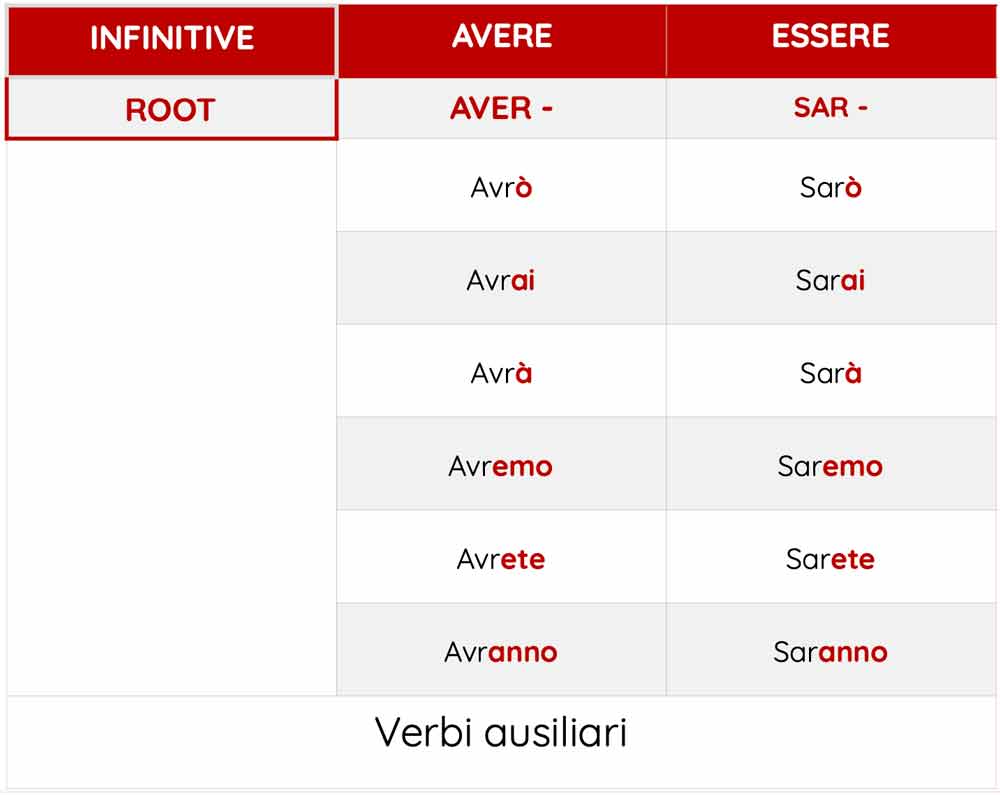
ITALIAN FUTURE
vs
ENGLISH FUTURE
- Future actions
- Anticipation
- Promises
- Assumptions
ITALIANO
FUTURO SEMPLICE
L’anno prossimo farò un viaggio in Europa
ENGLISH
FUTURE WITH WILL
Next year I’ll go on a long journey
• Future action already planned that undoubtedly will occur
ITALIANO
FUTURO SEMPLICE
Partirò sabato.
ENGLISH
TO BE + ING
I’m leaving on Saturday.
• A program decided but not still defined
• One purpose
ITALIANO
FUTURO SEMPLICE
Andrò all’università l’anno prossimo
ENGLISH
TO BE GOING TO
I’m going to go to university next year.
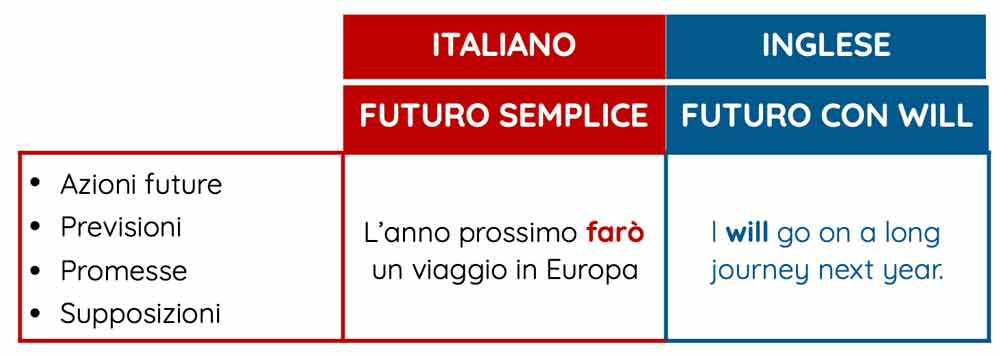
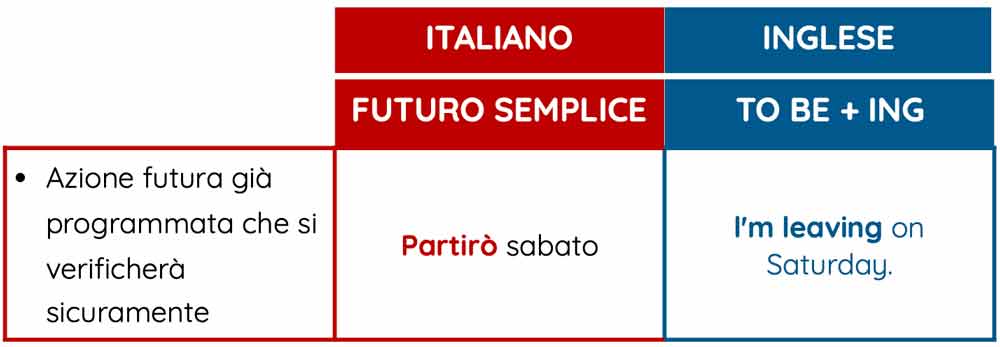
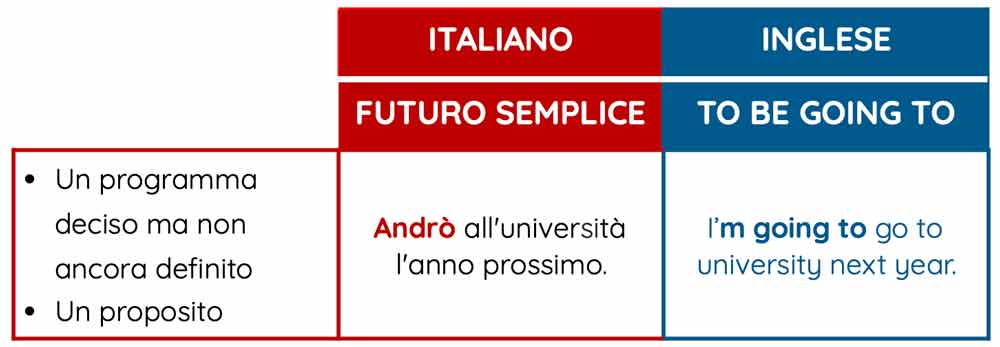
What’s next?
You might want to keep learning Italian online with these free resources:










Leave a Reply